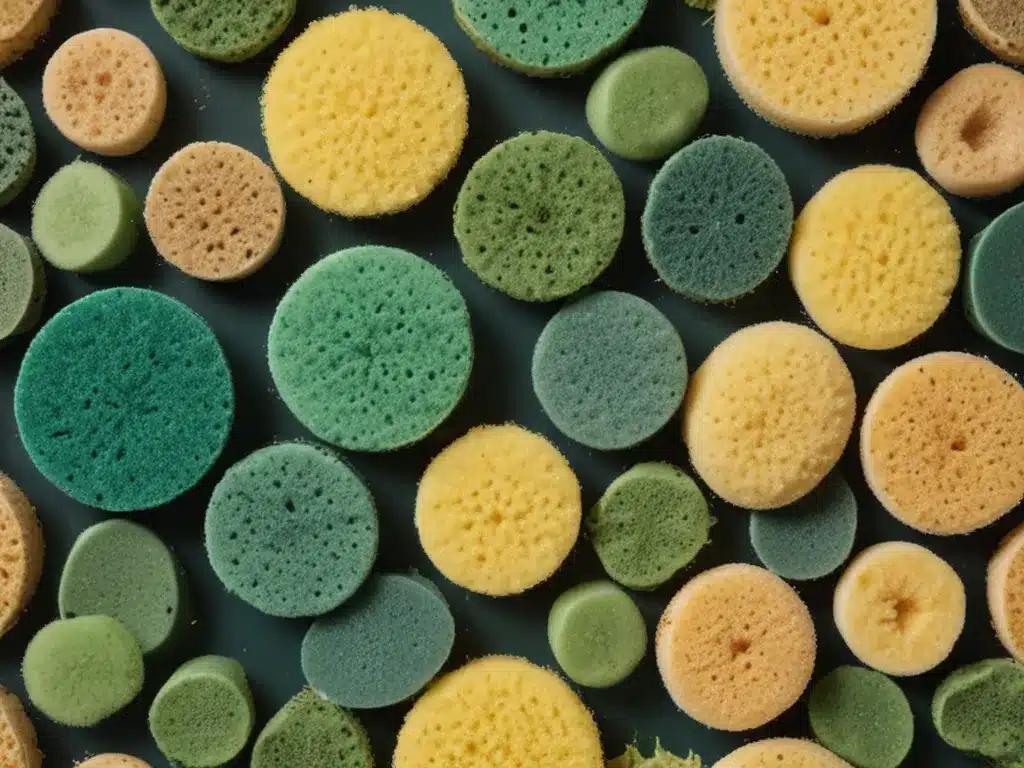Introduction
Cleaning is an essential part of maintaining a healthy home, but many cleaning tools contain plastics and other materials that are harmful to the environment. As consumers become more eco-conscious, the demand for sustainable cleaning products is growing. Sponges and brushes are cleaning tools that often contain plastic and can’t be easily recycled. Finding sponges and brushes made from renewable materials is an important step towards greening your cleaning routine. In this article, I’ll discuss the problems with common sponges and brushes, explain what makes a sponge or brush sustainable, and recommend some greener options to try.
Problems with Conventional Sponges and Brushes
Sponges and brushes are tools we use for scrubbing and cleaning. However, most mainstream options present some sustainability issues:
Contain Plastic
- Many sponges and brushes are made from polyester, nylon, and polyurethane – all forms of plastic.
- Plastics are made from fossil fuels, a non-renewable resource.
- Plastics take hundreds of years to biodegrade, polluting landfills and oceans.
Not Recyclable
- Sponges and brushes contain mixed materials that are difficult to separate.
- The plastic, glue, and cellulose materials cannot easily be recycled.
- Billions of sponges and brushes end up in landfills each year.
Harbor Bacteria
- Conventional sponges and brushes made from plastic have pores that trap food, grease, and bacteria.
- They require frequent replacement to avoid mold, mildew, and bacteria growth.
- More waste is created when replacing these items frequently.
What Makes a Sponge or Brush Sustainable?
When evaluating sponges and brushes, look for these characteristics of sustainability:
Made from Renewable Materials
- Wood, plant fibers, or cellulose-based materials are renewable.
- Choose materials like natural loofah, coconut coir fiber, wood, or plant-based cellulose.
Biodegradable
- Materials that can decompose back into the earth are preferable.
- Look for sponges and brushes labeled 100% biodegradable.
Compostable
- Opt for materials like untreated wood, loofah, and plant fibers that can be composted.
- Avoid composites like recycled paper glued to plastic.
Eco-Friendly Manufacturing
- Consider brands using green practices like renewable energy to create products.
- Locally-sourced materials also minimize transportation impact.
Cruelty-Free Materials
- Ensure no animal products like leather or wool are used.
- Vegan materials are ideal for an eco-friendly, compassionate choice.
Recommended Sustainable Sponge and Brush Options
Here are some specific sponges and brushes to consider making your cleaning routine greener:
Sponges
- Loofah Sponges – Natural loofah sponges are 100% biodegradable and compostable.
- Coconut Coir Sponges – Made from coconut husks, these sponges are compostable.
- Cellulose Sponges – Sponges made from plant-based cellulose are often compostable.
- Silicone Sponges – Silicone is a renewable material that lasts longer than conventional sponges.
Brushes
- Coconut Fiber Scrub Brushes – Compostable and biodegradable options for heavy scrubbing.
- Loofah Brushes – Gentler loofah is suitable for dishes and delicate surfaces.
- Wood Dish Brushes – Look for responsibly sourced wood with compostable bristles.
- Silicone Scrub Brushes – Silicone is more sanitary and lasts longer than plastic brushes.
When shopping, read labels carefully and research brands to find the most eco-friendly options. Consider supporting green businesses focused on sustainability. With some diligent label reading and research, finding greener sponges and brushes is very achievable.
Tips for Using Sustainable Sponges and Brushes
Here are some tips to follow when using eco-friendly sponges and brushes:
-
Compost – Compost natural sponges and brushes at the end of their lifespan.
-
Disinfect – Opt for natural disinfecting solutions like hydrogen peroxide or vinegar.
-
Air Dry – Allow to completely dry between uses to prevent mold and bacteria.
-
Reuse – Consider reusing options like loofahs and silicone for longer lifespans.
-
Replace Often – Even with natural materials, replace frequently for sanitation.
With some mindful usage and maintenance habits, sustainable sponges and brushes can effectively clean your home while keeping plastic waste out of oceans and landfills. Small sustainable swaps create significant positive impacts.
Conclusion
The key to greening your cleaning routine is using renewable, compostable materials for sponges and brushes. Avoid plastic-filled conventional options and choose natural materials like loofah, coconut coir, wood, and silicone instead. Support brands focused on sustainability through renewable resources and ethical manufacturing. Follow tips to maximize lifespan and effectiveness. We all have a role to play in reducing waste and plastic pollution. With more conscientious purchasing decisions and use of eco-friendly cleaning tools, consumers can make a real difference. Scrub greener for your home and the planet.







